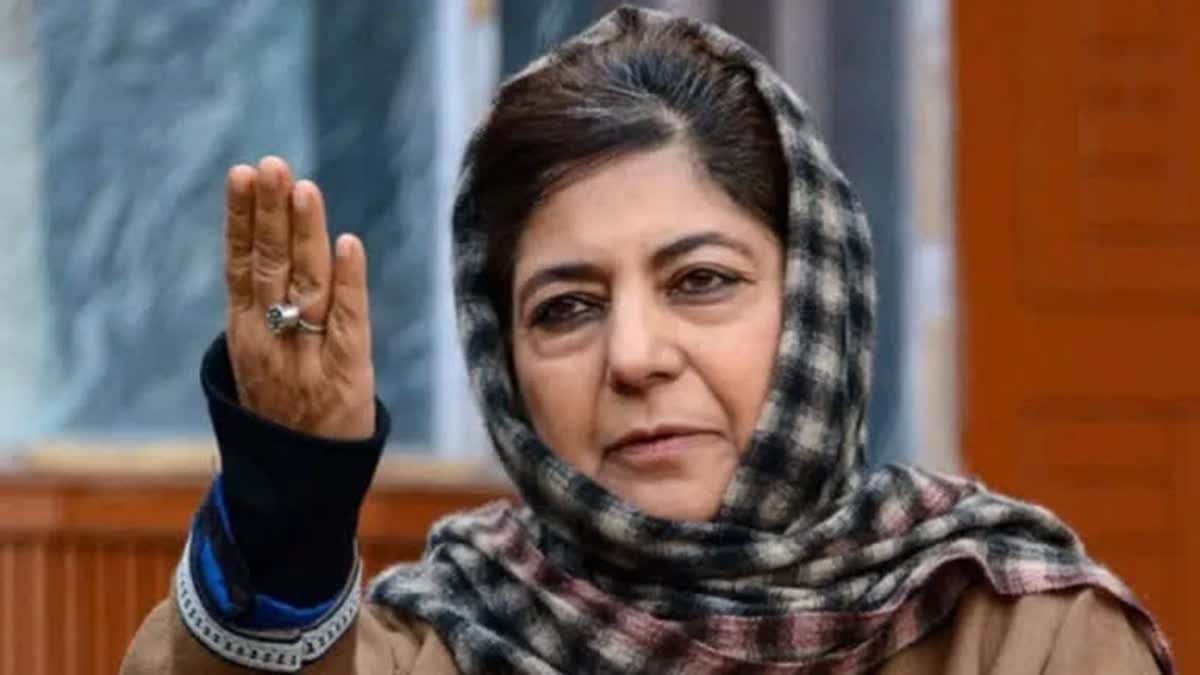SRINAGAR (Jammu and Kashmir): After Peoples Democratic Party (PDP) Chief Mehbooba Mufti claimed that the government's effort to house the homeless was an attempt to alter the demography of the Union territory, the Jammu and Kashmir administration has refuted the claims saying that "no outsider was being allotted land and there was no change in the law."
Manoj Sinha, the lieutenant governor, announced on Monday that the government of Jammu and Kashmir has begun giving landless households five marla plots for the construction of their homes as part of the Pradhan Mantri Awas Yojna (PMAY). "The department of rural development has identified 1.83 lakh households without their own homes. On it, we're working," he said adding that "2,711 landless households have already been given plots across the union area, a move that will not only give them a home but also alter their life."
Mehbooba Mufti, the former chief minister of Jammu and Kashmir, charged the LG government on Wednesday of bringing poverty and slums into the erstwhile state under the guise of accommodating the homeless. She described it as an effort to alter the demographic makeup of the Union territory. "The LG announced that the administration will provide land to 1,995,000 persons who were without it in Jammu and Kashmir.
Concerns and questions about who these landless people in Jammu and Kashmir are have surfaced. Only 19,000 homeless households are said to be living in Jammu and Kashmir, according to statistics the central government presented to Parliament," Mehbooba said. A few hours later, a spokesperson for the government stated: "The statement of Mehbooba Mufti that government is allotting land to two lakh odd persons is factually incorrect and all statements made by her are without having any understanding of the PMAY scheme and Revenue laws of the Jammu and Kashmir which permit allotment of land to landless, for housing purposes."
Therefore, he said, "neither the law has been changed nor is land being given to outsiders." According to the spokesman, PMAY (Grameen) phase-1 began on April 1, 2016, and 1,36,152 cases were approved for Jammu and Kashmir as part of the prime minister's overall commitment to "Housing for All by 2022" after Gram Sabhas properly verified 2,57,349 cases that were identified as homeless in Jammu and Kashmir in SECC data from 2011.
Under the programme, the Government of India provides per-unit assistance of 1.30 lakh rupees every dwelling. One marla is the minimum size of the residence that is required, he stated in a statement. According to him, the government carried out the Awaas Plus survey from January 2018 to March 2019 to determine whether beneficiaries alleged to have been overlooked by the 2011 SECC.
He claimed that the discrepancies between the overall objective and the qualified beneficiaries who were made accessible from the SECC Permanent Wait List (PWL) were filled using the beneficiary data collected through Awaas Plus. Based on a study of 2018–19 that was conducted across India, PMAY Phase–II (AWAS Plus) Grameen began in 2019; 2.65 lakh cases of homelessness were documented in Jammu and Kashmir, however only 63,426 homes were designated for Jammu and Kashmir.
Also read: We are fighting for our identity that is in danger: Mehbooba Mufti
Only in 2022 have these dwellings been approved, he continued. On March 31 of the next year, this phase of the plan will come to an end. In order to provide accommodation for all 2.65 lakhs houseless individuals who participated in PWL 2019, the spokesperson added that 1,99,550 extra PMAY Awas Plus dwellings were sanctioned as a special dispensation on May 30 of this year based on Jammu and Kashmir's strong performance in the approval and completion of houses.
According to him, the survey is based on precise rules that take into account everyone who is homeless, those who live in zero, one, or two-room kachha dwellings, and multi-layered prioritising as described in section 4 of the plan guidelines. The criterion also covers those people who are homeless and do not have land, clear title to property, or land that falls under a category where construction is prohibited; even if they are a part of this PWL, they cannot be approved for a house, he added.
According to the field level survey, 2,711 cases out of 1,99,550 people were found to not have a clear title to their land and to be living on state land, forest land, rakhs and rarms land, where construction is not allowed, people sitting on custodian land, land that the government gave to displaced people near Dachigam Park for agricultural purposes but where construction is not allowed, or any other category of cases.
"The government has made the policy choice to give these 2,711 instances a total of five marlas of land so they can receive dwellings since it cannot authorise the construction of a home for someone who lacks land." According to him, these 2,711 cases are a part of the 2018–19 PWL of homeless people in Jammu and Kashmir who were prevented from owning a home simply because they lacked land or because the land they did have was in a state, forest, or another category where development is prohibited.
The PDP president cited information from the Ministry of Housing and Urban Affairs, whereas the Ministry of Rural Development's PMAYG programme applied to rural parts of Jammu and Kashmir.



